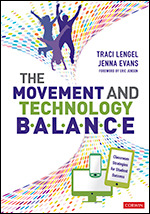The Movement and Technology Balance
Classroom Strategies for Student Success
- Traci Lengel - Educational Consultant
- Jenna Evans - Pocono Mountain School District
Foreword by Eric Jensen
Educate students in mind and body—and optimize their success.
There is no issue today that gets more attention and incites more debate than children’s use of technology. Technology offers exciting new opportunities and challenges to you and your students. Meanwhile, movement is essential to learning—it increases mental energy and helps brain cells develop. But screen time often comes at the expense of physical activity. How do you choose?
You don’t! This blended instructional approach combines kinesthetic teaching methodologies with technological resources to meet content standards, increase achievement and test scores, and enrich the learning process. Here you’ll find
- A neuroscientific overview of the powerful brain-body connection
- Step-by-step instructions for balancing movement and the use of technology in the classroom
- Practical tools, templates, and vignettes to ensure successful implementation
- Classroom management tactics and useful remedies for common problems
Educating the whole child means promoting social, physical, mental, emotional, and cognitive growth. By joining two powerful teaching tools, you’ll prepare students for a bright future—in school and in life—while growing your instructional expertise as well.
The Movement and Technology Balance: Classroom Strategies for Student Success should be on every teacher's desk and in every administrator's library! The subject is very timely in today's culture of the rise of technology and the resulting decline of physical activity in schools. This research-based book shows how to successfully blend intentional movement and purposeful technology by using kinesthetic lessons that can be done for any grade level or content area. Every chapter has valuable lessons and practical information for teachers, administrators, and educational leaders. Become a master at blending technology and movement in your classroom and your students will become successful, healthy, active learners!
Teachers, stand up and applaud! Traci Lengel and Jenna Evans have created a powerhouse teaching tool that addresses the educator’s dilemma of balancing ever-present technology demands with all students’ critical need for movement. As they state so passionately in their book, this balance must be found before it is too late!
The Movement and Technology Balance is jam-packed with calls to action, steps to acknowledge and address our limited teaching styles, and doable checklists to keep educators focused and moving forward. As true educational pioneers, the authors have developed a profound blueprint for teachers who are following in their large, impressive footsteps!
"The parallel rise of technology and a more sedentary lifestyle has made physical activity in schools immediately paramount! Traci Lengel and Jenna Evans describe this paradox and make insightful prescriptions for solving it. Backed by research to make the case for more physical activity in schools, they lay out several frameworks, in a detailed manner, for its effective use side-by-side with the technology needs of the modern classroom. This book also helps educators find the right balance between technology and physical activity, both of which are critical for all students. The Movement and Technology Balance is a must-have for every educator who wants to improve student attention, engagement, motivation, and achievement."
"Traci Lengel and Jenna Evans not only make a compelling argument for the benefits of kinesthetic teaching in the modern classroom, but also provide educators with the practical skills necessary to increase motivation, engagement, and achievement. 'Movement' should be the new movement in education."
"Unfortunately, technology use and social isolation have replaced physical activity and interpersonal relationships in many schools. Educators need a resource to assist learners to navigate this new terrain, which can lead to increased health disparities and even premature death. Traci Lengel and Jenna Evans have developed a brilliant direct application process for today's teachers.
As a college professor in School Health Education who trains Health and Physical Education majors to be successful in the K-12 environment, I believe this book is a perfect resource and accomplishes the following: It integrates technology to change negative health behaviors by increasing movement through learning, provides a recipe for developing the whole child to decrease long term health disparities, offers a skills-based approach to teaching the importance of movements and life skills toward health literacy, and utilizes differentiated instruction through technology with a focus on kinesthetic learning.
This 21st century educational resource demonstrates the paradigm shift needed to be successful teaching in today's K-12 environment and meet the societal challenges in how youth develop individually and interact personally. The Movement and Technology Balance is a must-read for all teachers.
